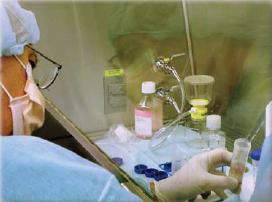
Stem cell treatments continue to gain ground in the United States. Louisiana based TCA Cellular Therapy has 6 FDA clinical trials in progress, the latest of which is the first approved US trial to use stem cells to treat ALS (Lou Gherig’s Disease). TCA performs autologous transplants that use a patient’s own bone marrow to produce stem cells, culture them, and then inject them back into the body. This avoids the need for donor matching. Among the other FDA approved clinical trials TCA has underway are studies on heart disease and limb ischemia (blood vessel blockages in legs). According to the TCA website, while the limb ischemia trials are still in phase II and phase III of FDA approval, the company hopes to begin treating patients for the condition in 2012. If ultimately successful in all phases of these trials, TCA would be able to provide its treatments anywhere in the country, and franchise the practice to others. TCA’s work is another example that, although it is taking its sweet time, FDA approved stem cell therapies are coming to the US.
We recently discussed how doctors in a Colorado clinic are already providing orthopedic stem cell therapies without the need for FDA approval by keeping treatments as part of a medical practice only. What is TCA gaining by going through rigorous FDA clinical trials? Well, they can eventually take their treatment, distribute it, and market it (it’s already patented). This means they have a lot to offer investors, and TCA is actively pursuing them. It’s unclear how much funding they’re looking for, but the first three years of work (7 FDA trials in progress or completed) took less than $3 million. Below is a promotional video from TCA that seems to be aimed at both patients and investors. It’s a little heavy on the rhetoric (the narrator really needs to chill out) but it highlights most of what you need to know about TCA. There’s a clip about a patient who was successfully treated (for heart disease/damage) starting at 2:47, and if you skip to 5:20 you’ll see a step by step explanation of how the autologous stem cell therapy is performed.
Whenever I see a company providing (or in the process of providing) stem cell therapies, I like to check if they are legit. TCA has already completed three phase I FDA clinical trials, and has several more in the pipeline. That’s a good sign. There are a few papers produced by TCA about their work currently ‘in press’ with major medical publications. Impressively, Dr. Jose Minguell has papers discussing mesenchymal (multipotent) stem cells and heart conditions that have been published in the American Journal of Cardiology, and in Experimental Biology and Medicine (part of the Royal Society of Medicine). These are high caliber credentials and a great sign that TCA’s science is top notch.
As part of that science, you should take note that TCA multiplies (cultures) stem cells before injecting them back into a patient. From my discussions with doctors in the field, this step is a crucial one. There are many clinics (all over the world) that will withdraw and isolate stem cells. Yet, if these cells aren’t in a high concentration, it seems unlikely that you’ll get an effective dose. TCA spends 3 weeks or so culturing a patient’s cells until they have 30-40 million mesenchymal (multipotent) adult stem cells. This work is performed at their in-house GMP lab and stored at Life Source Cryobanks (which TCA has a controlling interest in). Again, these are signs that TCA knows what it’s doing.
Unfortunately, there aren’t a lot of hard numbers to reveal how effective each stem cell treatment has been in trial. Judging by the titles of the papers TCA has currently ‘in press’, those numbers are likely to be forthcoming. There are a series of patient testimonials, but we’ve seen these from every other stem cell clinic in existence.
Patients are clamoring for stem cell therapies, and except for a few clinics in the US, they generally must travel outside the US to get them. While a 2012 arrival for a stem cell ischemia treatment sounds good, the estimate could be off by months or years. And while I appreciate the seriousness of ischemia, it is just one of many conditions (diabetes, AIDS, blindness) that could possibly be treated by stem cell therapies. ALS, which has few effective treatments, is just the latest in the list of illnesses whose sufferers are going to pressure the FDA for quick approval. In other words, I don’t think we’re going to see the demand for US stem cell therapies to be satisfied any time soon.
Of course, that demand isn’t a bad thing. It will hopefully encourage investors to keep TCA well funded as it continues its clinical trials. Eventually, the rigorous methodologies of the FDA should pay off and we’ll have many different effective stem cell treatments. Look at TCA. Even within just one stem cell company we see efforts to treat several different forms of cardiovascular damage and a neurological illness (ALS). That’s an encouraging sign of the variety of stem cell therapies we’ll have on hand in the next few years. In the meantime, the struggle for patients to receive the treatments they want, regardless of government approval, will continue.
[image credit: TCA]
[source: TCA Cellular Therapy, Clinical Trials.gov, Experimental Biology and Medicine, Google Health]


